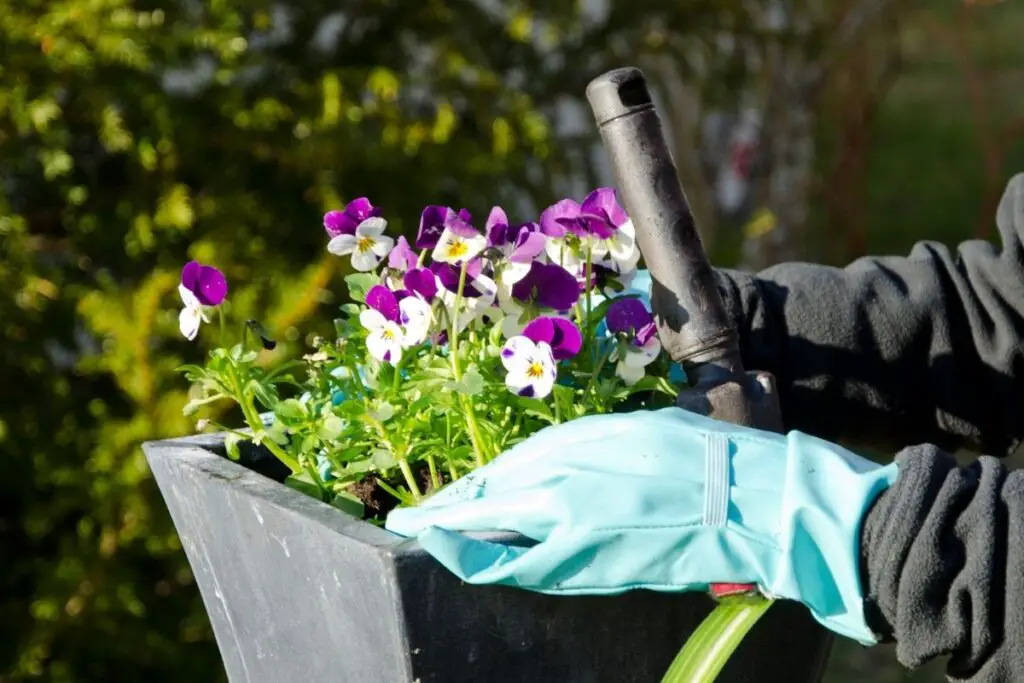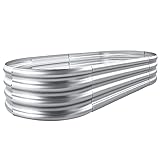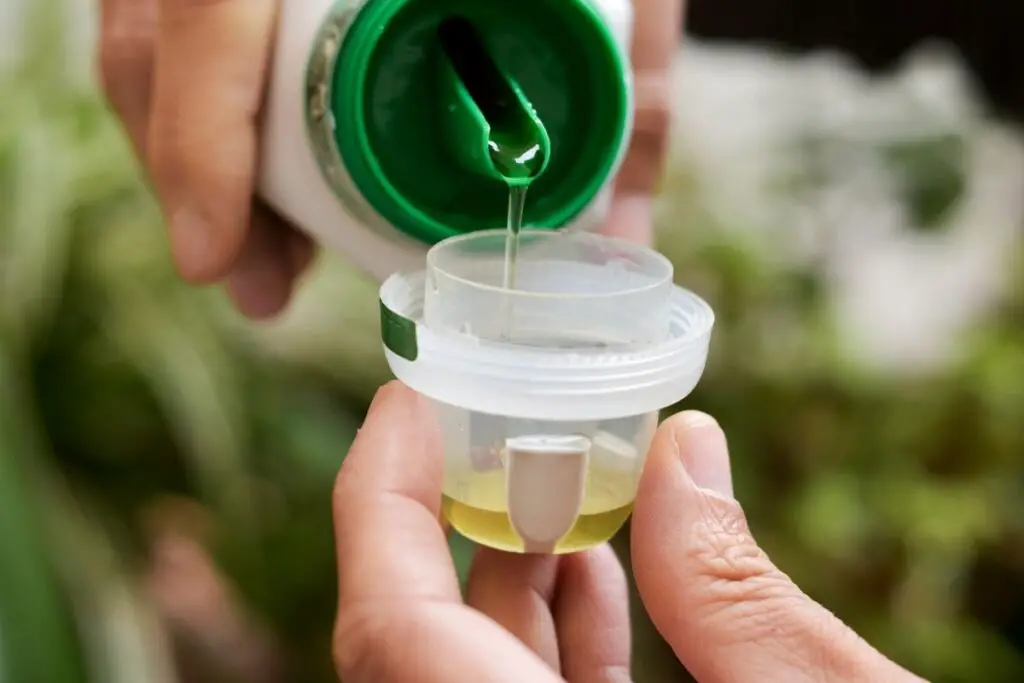Pansies look stunning when they bloom, but they do need a lot of nutrients for their growth. A common question that you might be wondering is, do pansies need fertilizer. How much and how often? Let’s find out.
As a general rule, pansies thrive when dosed with an all-purpose balanced fertilizer with an NPK ratio of 20:20:20. Fertilize your pansies with a good fertilizer once a month during the growing season and dilute the fertilizer to half-strength to avoid overfertilization problems.
When pansies grow in their natural habitat, they get all the essential nutrients from nature needed for their healthy growth. However, if you want to grow them on your garden, you have to provide all the essential elements to see them growth in your garden.
Fertilizers fuel the growth of pansies and make them bloom well, so it would be best not to skip this.
In this article, we will discuss all the rules that you must follow while fertilizing your pansies. We will also understand when and how to fertilize, how often to fertilize, the best fertilizer for pansies, and the points you must consider while fertilizing.

Should I give fertilizer to pansies?
Fertilizing the plants, you are growing in your garden is essential because they are not in their natural habitat. You are growing them in your garden. So, make sure to provide them with the essential nutrients manually.
When you water your plants frequently, all the essential nutrients wash away with every watering. Giving them fertilizers timely will help the plants absorb the necessary nutrients for their growth and development.
However, make sure not to overfertilize your pansies as that can harm the pansies. If you are not sure about the quantity of fertilizer, always use a smaller quantity.
Less fertilizer will not cause any harm. It is better than using less fertilizer as excess fertilizer may damage your pansies and burn them. So be careful while fertilizing.
Stunted and slow growth is one of the reasons that you might notice if you don’t fertilize your pansies. Nitrogen deficiency will cause stunted growth in the pansies. As fertilizers contain nitrogen, using fertilizers will boost the growth of pansies.
But, do not use fertilizers containing a lot of nitrogen as that can result in excess foliage in your pansy flowers.
When should I fertilize my pansies?
Pansies grow well when they receive nitrogen fertilizers, especially in nitrate form when the soil cools in late fall and winter.
Fertilize your pansies once a month or after every two to three weeks during the spring and fall months. It will help the pansy receive all the essential nutrients needed for vigorous growth.
During winters, pansies need extra fertilizers. Winter can cause a stretch in the plants. Use liquid fertilizers during winters, as it can be difficult for the plant to absorb granular fertilizers at cold temperatures. Add fertilizer every few weeks throughout the winter to maintain the growth.
Looking for gardening supplies? We have tested 100's of products before recommending them to you guys. Check out our best pick below:
| Image | Gardening Supplies | Best Price? |
|---|---|---|
 Top
Top Top
Top | Raised Garden Bed Kit | Check On Amazon |
 | XLUX Soil Moisture Meter, Plant Water Monitor, Soil Hygrometer Sensor for Gardening, Farming, Indoor and Outdoor Plants, No Batteries Required | No Results |
 Top
Top Top
Top | 82 Pcs Garden Tools Set and Extra Succulent Tools Set | Check On Amazon |
 | Joeys Garden Expandable Garden Hose with 8 Function Hose Nozzle, Lightweight Anti-Kink Flexible Garden Hoses, Extra Strength Fabric with Double Latex Core, (50 FT, Black) | No Results |
 Top
Top Top
Top | Dual Chamber Compost Tumbler | Check On Amazon |
 Top
Top Top
Top | Sunnyglade Plant Stakes | Check On Amazon |
 Top
Top Top
Top | Organic Cold Pressed Neem Seed Oil | Check On Amazon |
 Top
Top Top
Top | Mighty Mint Gallon :-Insect and Pest Control Peppermint Oil | Check On Amazon |
 Top
Top Top
Top | Scotts DiseaseEx Lawn Fungicide | Check On Amazon |
 Top
Top Top
Top | Jacks Classic 20-20-20 All Purpose Fertilizer | Check On Amazon |
 Top
Top Top
Top | 30,000 Seeds Pollinator Attracting Wildflower Mixture | Check On Amazon |
 Top
Top Top
Top | Survival Vegetable Seeds Garden Kit-Over 16,000 Seeds | Check On Amazon |
How often should you fertilize your pansies?
Neglecting pansies will result in weakness in the plants, and they won’t grow any flowers either. So, you need to fulfill their nutrient requirements significantly when you are growing them in your garden.
Pansies need to be fertilized every two to three weeks during their growing season. This will help to boost root and plant growth. Using fertilizers will also help in blooming flowers.
When you water the pansies regularly, the vital nutrients get washed. So, you must fertilize pansies once a month. This will help the plant receive nutrients constantly and boost the growth rate of the pansies.
During winters, pansies need a little more fertilizer than usual. So, during winters, you need to give fertilizers every few weeks to see consistent growth.
You can use both liquid fertilizers and granular fertilizers for your pansies. Usually, liquid fertilizers are applied more frequently than granular fertilizers.
But in winter, I would recommend using the liquid one, as due to dry and stretchy weather, the plant faces difficulty absorbing the granular one. The liquid will be easy to absorb.
So, fertilize once a month during the spring and fall months. Fertilize every 2-3 weeks during winters.
What is the best fertilizer for pansies?

The standard program of fertilizer for pansies is 20ppm or you can say NPK ratio of 20-20-20 or any good granular fertilizer. They work best for pansies in the growing season.
Some of my top picks of fertilizer for your pansies are:
- Jacks Classic 20-20-20 All Purpose Fertilizer (Best synthetic fertilizer)
- Triple 10 All Purpose Liquid Fertilizer
- Worm Castings Organic Fertilizer (Best Organic Pick)
- Charlie’s Compost
Nitrogen in nitrate form works best for pansies, especially when the soil cools down in the late fall and winters. The nitrate form can be absorbed easily by the soil.
Slow-release fertilizers work well with pansies. You can mix them with soil while preparing the soil mix for planting the pansies in the garden. You can use this fertilizer after planting the pansies as well, but make sure to water your plants well if you are using this fertilizer.
You can also opt for liquid fertilizer for your pansies. Apply them after some weeks of planting pansies to give them the necessary nutrients for healthy growth.
Winters are a good time for using liquid fertilizer because during this dry season, they need extra fertilizer, and absorbing nutrients from the liquid form is easier than absorbing from the granular form.
But, the best way to fertilize pansies is with a complete fertilizer. This means whatever fertilizer you are using, granular or soluble, must possess a complete formula.
A complete formula means – Nitrogen (N), Phosphorous (P), and Potassium (K).
This is important because:
- Nitrogen encourages new growth and increases metabolism. It is a fundamental part of the chlorophyll molecule that helps in cellular growth and division and is essential for photosynthesis.
- Phosphorous encourages better root growth and is one of the crucial elements for photosynthesis.
- Potassium encourages sound water regulation and boosts the immune system of plants.
A study by West Virginia University Extension Service suggests using a balanced fertilizer like 10-10-10 or 20-20-20, containing the complete formula.
You can also use bone meal, which is a phosphorus-rich fertilizer that can promote flowering in your pansies.
How to fertilize the pansies?

In most areas, pansies are treated as annual plants. While in others, they are treated as a perennial plant.
Whatever the case may be, your pansies will always grow well if you fertilize them properly. Fertilize them once a month or every two to three weeks, depending on the season and the fertilizer type.
Granular fertilizer
While using granular fertilizer, remember:
- Sprinkle some fertilizer around the plants, one teaspoon per square foot of flower bed. Apply them only over the soil.
- Avoid sprinkling on the plant, as that will burn your plant.
- Water the soil slowly and thoroughly.
- Add it once a month.
Liquid fertilizer
While using this type of fertilizer, you must remember these:
- Mix the liquid fertilizer with the water in the watering can.
- The mixing must be done according to the size of the flower bed.
- Read the instructions carefully and then do the mix the liquid fertilizer with water.
- After that, water your plant thoroughly so that the water reaches the deepest roots.
Things to keep in mind while fertilizing pansies
While fertilizing pansies, there are certain things you need to remember:
- Use fertilizers that are suitable for pansies: You must use fertilizers that are suitable for your pansies. Any other type of fertilizer or a wrong fertilizer can harm your pansies. Instead of boosting its growth, it will affect the metabolism of the plants.
- Use less fertilizer when in doubt: If you doubt the amount of fertilizers you give to the pansies, use less fertilizer. Less fertilizer will not harm your plant.
- Add water: Add a good amount of water to your pansy plants and after fertilizing. This will help to wash away excess fertilizer remaining in the soil.
- Check the measurement properly: Sometimes, you can end up using excessive fertilizer. This can happen when you are distracted or if you are in a rush. So, recheck the amount of fertilizer before applying them to your pansies.
- Avoid combining fertilizer: Avoid combining slow-release or granular fertilizers with water. If you do so, you won’t be able to guess whether your pansy is getting its right amount of fertilizer or not.
Over-fertilizing pansies
You should never over-fertilize your pansies as that can burn the roots and the leaves. The burns are caused due to the chemicals present in the fertilizers.
Over-fertilizing causes problems like droopy leaves, stunted growth, and spots on leaves.
The best way to treat over-fertilization is to wash your plant thoroughly with clean water and give it some time to recover. After the plant has recovered, you can start applying fertilizer again.
To avoid the problem of over-fertilization, you should use less fertilizer. Sometimes, we can be doubtful about the quantity of fertilizer that needs to be provided to the pansies. When you are confused, you must reduce the amount of fertilizer.
So, to avoid over-fertilizing, recheck your fertilizer amount.
Final words
Fertilizing is essential for growing your pansies. Fertilizers help to provide all the necessary nutrients that your pansies need.
Use fertilizers once a month. You can use either granular or liquid fertilizers.
During winters, liquid fertilizers work well because it is easier for the pansies to absorb the nutrients from the liquid form.
Use fertilizers with the balanced N-P-K formula. This works best for pansies. Use fertilizers that are suitable for the pansies and try to avoid overfertilizing or under-fertilizing the pansies.
Ref: The University of Arkansas, Britannica, Utah State University, Wikipedia, The University of Georgia, The Pennsylvania State University, The Royal Horticultural Society.
